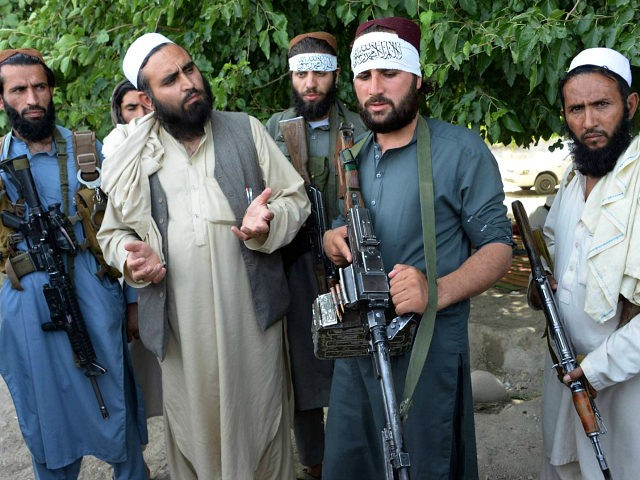The Taliban wants to change the venue of scheduled peace talks with the United States this month from Saudi Arabia to Qatar over Riyadh’s push to include the Afghan government in the negotiations, members of the Taliban declared on Sunday.
Reuters reports:
The upcoming negotiations, the fourth in a series aimed at ending the 17-year war in Afghanistan, are scheduled between the leaders of the Taliban and US special envoy Zalmay Khalilzad to discuss the withdrawal of foreign forces and a possible ceasefire in 2019.
Leaders of the hardline Islamic militant group have rejected the Kabul government’s offer for direct talks, despite growing international pressure in favor of the Western-backed Afghan government having a seat at the table.
Qatar, home to the Taliban’s political headquarters, has long hosted and legitimized political leaders from the terrorist organization.
“We were supposed to meet US officials in Riyadh next week and continue our peace process that remained incomplete in Abu Dhabi last month,” a senior Taliban jihadi based in Afghanistan told Reuters on condition of anonymity, adding, “The problem is that leaders of Saudi Arabia and the United Arab Emirates (UAE) wanted us to definitely meet the Afghan government delegation, which we cannot afford to do now, and we have canceled the meeting in Saudi Arabia.”
Saudi Arabia, Pakistan, and the UAE are the only countries that officially recognized the terrorist group’s regime during its five years of oppressive rule in Afghanistan and are believed to have significant influence over the group.
Another unnamed senior Taliban insurgent indicated that the narco-jihadis explained to Saudi Arabia that it was not possible for the group to meet Kabul at this stage.
“Everyone is aware of the fact that the Afghan government wanted the U.S. and its allies not to leave Afghanistan and we have paid a heavy price to expel all foreign forces from our country,” he told Reuters. “Why should we talk to the Afghan government?”
Zabihullah Mujahid, a spokesman for the Taliban, reportedly confirmed that the group had canceled the meeting in Saudi Arabia but did not reveal the location of the new venue.
The U.S. has not commented on the change of peace talks venue.
Mujahid recently told Voice of America (VOA) its negotiations with the United States for ending “the war and illegitimate occupation” of Afghanistan remain on track.
“There has been no interruption in the dialogue process with America because ending the occupation of Afghanistan is now a compulsion for them [U.S.],” Mujahid told VOA.
In the wake of reports that the U.S. is considering withdrawing half of the estimated 14,000 troops deployed to Afghanistan, American Vice President Mike Pence recently told Fox News that the commander-in-chief is in the “process of evaluating” pulling some service members from the war-ravaged country.
The White House had previously dismissed news reports of a U.S. troop withdrawal from Afghanistan.
On social media, Mujahid reportedly appeared optimistic about the series of U.S.-Taliban negotiations in recent months.
“We can say with certainty that they indeed proved effective. They have given birth to hope that should the negotiations continue with such speed, then it is possible that foreign aggression be brought to an end, following which peace will be established,” the Taliban spokesman declared.
He defended the narco-terrorist group’s stance for not holding talks with the Afghan government, dismissing Kabul as the product of “foreign occupation” of Afghanistan, with no “authority or ability” to end to the war.
The Taliban is fighting to restore strict Islamic law, or sharia, in Afghanistan. Trump administration officials have come out in support of a ceasefire and relegitimizing the Taliban as an official political power. U.S. troops removed the Taliban from power in Afghanistan in late 2001.
The Trump administration has made “political reconciliation” between Kabul and the Taliban the primary tenet of its strategy to end the war, which started in October 2001.
In its latest assessment of the war, the Pentagon said:
The United States has a single vital national interest in Afghanistan: to prevent it from becoming a safe-haven from which terrorist groups can plan and execute attacks against the U.S. homeland, U.S. citizens, and our interests and allies abroad. Our ultimate goal in Afghanistan is a negotiated political settlement between the Afghan government and the Taliban.
In recent months, the United States, via Trump’s Afghan reconciliation envoy, Zalmay Khalilzad, has intensified efforts to bring the Taliban to the negotiating table.
Marking a major departure from previous administrations long sought by the Taliban, the U.S. is negotiating directly with the group. Khalilzad has met with the group on several occasions. The Taliban generates most of its funding from trafficking heroin, some of which is partly fueling the unprecedented fatal drug overdose epidemic in the United States.
The U.S. has conceded that it will not see a military victory in Afghanistan, home to the highest concentration of terrorist groups (20) in the world.

COMMENTS
Please let us know if you're having issues with commenting.